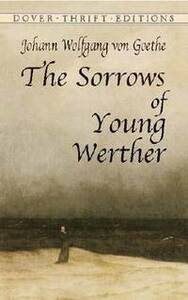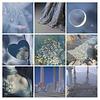Take a photo of a barcode or cover
emotional
reflective
sad
medium-paced
Plot or Character Driven:
Character
Strong character development:
Complicated
Loveable characters:
Yes
Diverse cast of characters:
No
Flaws of characters a main focus:
Yes
This my first experience with the works of Goethe, and whilst I admire the meticulous descriptions of love, obsession and heartache, I was a little tired of the repetitive nature of the story and the wallowing misery of Werther.
The Sorrows of Young Werther is an uncompromising look at what it means for someone who is denied their one true love, and how they cannot function without them.
I think I would’ve appreciated this more when I was an adolescent, because, as it stands, I’m too bitter and burnt out to be moved by the dilemma that the couple face.
Whilst I expected more from Goethe, and can’t say I really enjoyed it, I recognise the strengths and qualities it undeniably contains.
“I have so much in me, and the feeling for her absorbs it all; I have so much, and without her it all comes to nothing.”
The Sorrows of Young Werther is an uncompromising look at what it means for someone who is denied their one true love, and how they cannot function without them.
I think I would’ve appreciated this more when I was an adolescent, because, as it stands, I’m too bitter and burnt out to be moved by the dilemma that the couple face.
Whilst I expected more from Goethe, and can’t say I really enjoyed it, I recognise the strengths and qualities it undeniably contains.
“I have so much in me, and the feeling for her absorbs it all; I have so much, and without her it all comes to nothing.”
It’s a slip of a book, a mere 150 pages, so I didn’t think it would take long.
Wrong. The books makes you stop and think so often, and if you’ve ever been heartbroken it tugs at your heart so much that you have to take breaks from it. I read it in three big chunks, but I loved Werther and his insane passion from the start, before he met Lotte and was describing his love of nature. What I love — and I mean, really love — about it is that it is not graphic at all, there is sexual attraction but nothing that would prompt a PG rating, let alone anything above. Furthermore, despite his all-consuming adoration for Lotte, they do not consummate their relationship.
Two other things fascinated me: first, that Werther was a man. Maybe I’m approaching this book as a woman who has recently seen plays begging to empower women, but it’s a very interesting choice that Werther is a man and not a love-struck woman. If you have read it, imagine having read it with a female character. Do you think the novel would have survived all these years? Or do you think it would have been more easily disregarded as “just another woman in love”? The second thing that kept my mind whirring away was Lotte, and how she felt about Werther. The style the novel is written in — we read it through letters and diary entries — means everything we see (apart from a few ‘editor’s notes’ which are actually Goethe as a narrator) is seen through Werther’s eyes. What can we trust? What was exaggerated through the eyes of a man infatuated? I wonder, too, if Fraulein B had not been part of the aristocracy, if there had been a real chance at a relationship between the two of them, would his love for Lotte resulted so catastrophically?
Above all, though, it is the language and the observations that Werther makes that make this novel so touching and endearing. I don’t know how much of this is owed to the translator, but it is very easy language that is as transferrable to us today as it was the day it was written. After all, unrequited love is probably the most common of all love, and many of us will have felt the acute pain that comes with loving one we cannot have. Thankfully, few of us will fall into such deep despair as Werther, but his words and his declarations will forever be a comfort.
Needless to say, I can’t wait to read more by Goethe.
Wrong. The books makes you stop and think so often, and if you’ve ever been heartbroken it tugs at your heart so much that you have to take breaks from it. I read it in three big chunks, but I loved Werther and his insane passion from the start, before he met Lotte and was describing his love of nature. What I love — and I mean, really love — about it is that it is not graphic at all, there is sexual attraction but nothing that would prompt a PG rating, let alone anything above. Furthermore, despite his all-consuming adoration for Lotte, they do not consummate their relationship.
Two other things fascinated me: first, that Werther was a man. Maybe I’m approaching this book as a woman who has recently seen plays begging to empower women, but it’s a very interesting choice that Werther is a man and not a love-struck woman. If you have read it, imagine having read it with a female character. Do you think the novel would have survived all these years? Or do you think it would have been more easily disregarded as “just another woman in love”? The second thing that kept my mind whirring away was Lotte, and how she felt about Werther. The style the novel is written in — we read it through letters and diary entries — means everything we see (apart from a few ‘editor’s notes’ which are actually Goethe as a narrator) is seen through Werther’s eyes. What can we trust? What was exaggerated through the eyes of a man infatuated? I wonder, too, if Fraulein B had not been part of the aristocracy, if there had been a real chance at a relationship between the two of them, would his love for Lotte resulted so catastrophically?
Above all, though, it is the language and the observations that Werther makes that make this novel so touching and endearing. I don’t know how much of this is owed to the translator, but it is very easy language that is as transferrable to us today as it was the day it was written. After all, unrequited love is probably the most common of all love, and many of us will have felt the acute pain that comes with loving one we cannot have. Thankfully, few of us will fall into such deep despair as Werther, but his words and his declarations will forever be a comfort.
Needless to say, I can’t wait to read more by Goethe.
Der hauptcharakter ist weinerlich, nervig und im Grunde, ein ziemlich schlechter Mensch. Er spendet und hilft armen, aber versucht macht alles über sich und versucht alles, damit Lotte sich nach seinem Selbstmord für diesen schlecht und schuldig fühlt... Great guy.
Seine obsession mit einer vergebenen Frau gibt mir dass Gefühl, dass er das Severus Snape blueprint ist.
Wäre ich Wilhelm, hätte ich nach dem zweiten Brief meinem Tod vorgetäuscht, damit Werther aufhört mich mit so unnötigen gelaber vollzuquatschen.
Denkt göthe, dass man Seitenlänge Dialoge die man geführt hat hinterher noch Wort für Wort zu Papier führen kann? Macht irw keinen Sinn.
Seine obsession mit einer vergebenen Frau gibt mir dass Gefühl, dass er das Severus Snape blueprint ist.
Wäre ich Wilhelm, hätte ich nach dem zweiten Brief meinem Tod vorgetäuscht, damit Werther aufhört mich mit so unnötigen gelaber vollzuquatschen.
Denkt göthe, dass man Seitenlänge Dialoge die man geführt hat hinterher noch Wort für Wort zu Papier führen kann? Macht irw keinen Sinn.
emotional
reflective
sad
medium-paced
Plot or Character Driven:
Character
Strong character development:
Complicated
Loveable characters:
Complicated
Diverse cast of characters:
No
Flaws of characters a main focus:
Yes
slow-paced
challenging
dark
emotional
inspiring
reflective
sad
tense
medium-paced
Plot or Character Driven:
Character
Strong character development:
Complicated
Loveable characters:
Complicated
Diverse cast of characters:
No
Flaws of characters a main focus:
Yes
emotional
medium-paced
Plot or Character Driven:
Character
Loveable characters:
Yes
Flaws of characters a main focus:
Yes
dark
emotional
medium-paced
Plot or Character Driven:
Character
Strong character development:
Complicated
Loveable characters:
Yes
Diverse cast of characters:
No
Flaws of characters a main focus:
Yes



